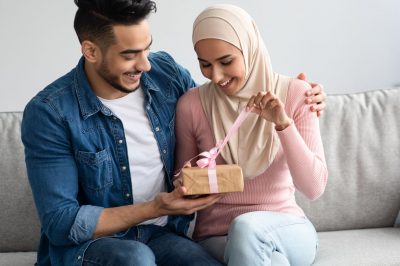My husband works one hour a away from where we live..
He has a habit of going out to lunch and dinner with people from work, and his cousins and friends.
He is Arab and I'm American. On one of these occasions when he was out we had been in contact through the phone talking and texting but he didn't mention that he is out with them.
My problem is I feel like sharing such details is what bonds you through love, etc.
I only found out he went out that day through bank statements.
Is it wrong that I should assume he tells me these things? I'm also not comfortable with some words of affection in his communication with friends. Is it normal to show love to his friends? thanks for your advice.
Answer
In this counseling answer
There are some cultural differences between Arab and American Muslims.
The men often use terms like habibi and others to denote affection and closeness.
This can be mistaken for other things by Americans who are not familiar with their culture.
Sister, sit down with your husband and explain to him that you understand there are cultural differences in communication at times.
It could be that the two of you just need to clarify and talk more about things that may seem unimportant or insignificant in order to the other not to get the wrong impression.
As salamu alaykum dear sister,
Shokran for writing into us. As I understand it, your husband works an hour from your home.
He also goes out to lunch and dinner with co-workers, cousins, and friends.
You stated that he keeps in contact with some of these people through text messages and phone.
Doubt
Your question as I see it relates to the appropriateness of these texts and phone calls as well as if there is a chance he could be cheating, rather than eating.
There are some cultural differences between Arab and American Muslims as you know.
For instance, Arab men can easily sow affection to their close male friends and family and are usually stand-offish with females who are not family.

The men often use terms like habibi and others to denote affection and closeness.
This can be mistaken for other things by Americans who are not familiar with their culture.
Found out through other means
While you did not say whom he was texting and talking to, but you did see on a bank statement that he went out to eat, then insha’Allah that is what he was doing.
At this point, I am unclear if the two of you were texting and talking as you said ‘we had been in contact by phone and texting” or if it was someone else and you saw or overheard the conversation.
In any event sister, I kindly suggest that you sit down with your husband when things are calm and talk to him about how you feel based on what you have seen and heard.
Do not approach him with accusations or when your upset as he will feel like he has to be defensive.
Check out this counseling video:
Explanation
Just explain to him that you understand there are cultural differences in communication at times as well as expressions and that you would like to have a clearer understanding of what is meant by his conversation with (insert person’s name).
It may be totally innocent sister and he was truly just having lunch/dinner.
However, good communication skills between husband and wife are vital for a successful marriage.
It could be that the two of you just need to clarify and talk more about things that may seem unimportant or insignificant to one, in order to the other not to get the wrong impression.
If something is going on sister, insha’Allah when you speak with him you will be able to tell by his reaction in his voice and body language.
Insha’Allah sister by having this conversation with your husband, all will be cleared up for you.
You are in our prayers, please let us know how you are.
Salam,
***
Disclaimer: The conceptualization and recommendations stated in this response are very general and purely based on the limited information provided in the question. In no event shall AboutIslam, its counselors or employees are liable for any damages that may arise from your decision in the use of our services.
Read more:
https://aboutislam.net/family-life/husbands-wives/spouses-takes-two-communicate-watch/

